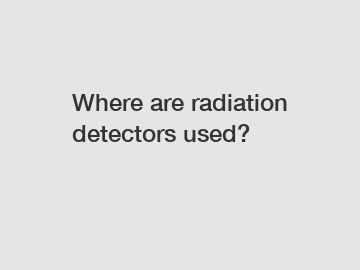Where are radiation detectors used?
Where are radiation detectors used?
Radiation detectors play a vital role in various industries and applications, ensuring safety and monitoring radiation levels. But where exactly are these detectors used? Let's delve into some of the key areas where radiation detectors are employed and understand their significance in promoting a safer environment.
1. Nuclear Power Plants:

One of the most critical applications of radiation detectors is in nuclear power plants. These detectors are utilized to monitor radiation levels within the facility, ensuring the safety of workers, the public, and the environment. By constantly monitoring radiation levels, these detectors provide early warning signs of any potential leaks or abnormal levels that could indicate a compromised reactor. The use of radiation detectors ensures that any issues are promptly addressed, preventing accidents and minimizing the risk of exposure to harmful radiation.
2. Medical Facilities:
Radiation detectors are extensively used in medical facilities like hospitals and diagnostic centers. These detectors are employed in radiology departments to measure and monitor radiation exposure during imaging procedures such as X-rays, CT scans, and PET scans. They help determine the appropriate dosage for patients, ensuring that radiation exposure is within safe limits. Additionally, radiation detectors are used during radiation therapy treatments to ensure precise and accurate delivery of the radiation dose to cancerous cells while minimizing exposure to healthy tissues.
3. Environmental Monitoring:
Radiation detectors are essential in environmental monitoring to measure and track radiation levels in the air, soil, and water. This application is particularly crucial in areas near nuclear power plants, research facilities, and sites with a history of nuclear accidents. By continuously monitoring the environment for radiation, these detectors allow authorities to take necessary actions in the event of elevated radiation levels, protecting both human health and ecosystems.
4. Industrial and Manufacturing:
Various industrial and manufacturing processes can generate ionizing radiation. Radiation detectors are employed in these settings to monitor and control radiation levels, thereby safeguarding both workers and the general public. For instance, industrial radiography, which uses gamma rays to inspect welds or detect flaws in materials, requires accurate radiation detectors to ensure appropriate safety measures are in place. Similarly, radiation detectors are used in the mining industry to track and control exposure to potentially harmful radiation sources.
5. Homeland Security:
Radiation detectors play a crucial role in maintaining homeland security by preventing unauthorized access to and transport of radioactive materials. These detectors are used at airports, seaports, and border crossings to screen people, luggage, cargo, and vehicles for any potential radioactive threats. By identifying and apprehending individuals who may possess harmful radioactive substances, radiation detectors help in preventing potential acts of terrorism and protect national security.
In conclusion, radiation detectors find application in various industries and sectors, ensuring safety, and protecting individuals and the environment from harmful radiation exposure. From nuclear power plants and medical facilities to environmental monitoring and homeland security, these detectors are indispensable tools. By continuously monitoring and detecting radiation levels, they enable prompt action, preventing accidents, and allow for safer practices. Now more than ever, with the growing importance of nuclear power, medical advancements, and security concerns, radiation detectors are essential for maintaining a secure and protected world.
For more information, please visit radiation protection solutions, introduction to radiation detectors, I-131 radiotherapy.


